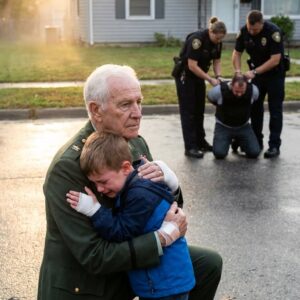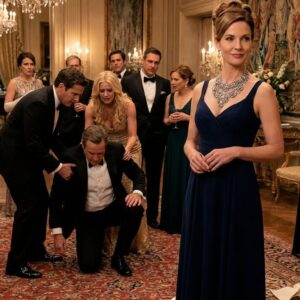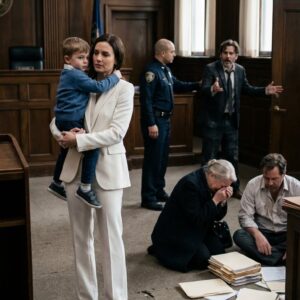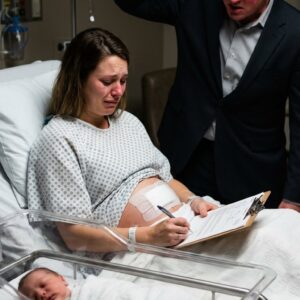The blizzard had swallowed the town whole. Snow whipped through the streets, rattling window frames, piling high on the corners, and muffling everything in an eerie hush. The streets were nearly deserted, but inside a shabby little diner at the edge of town, the faint glow of yellow light pushed back against the storm. Behind the counter, James Whitaker moved slowly with a rag in his hand, wiping tables that hadn’t seen customers in hours.
His hands were cracked from years of dish soap and cold winters, his apron a canvas of stains from a thousand meals cooked and served. He looked tired, but there was warmth in his eyes—the kind of warmth that kept the little diner alive even when the town around it seemed to be dying. He turned when the bell above the door jingled softly, startled to see two children standing there.
They couldn’t have been more than eleven and six, a boy and his younger sister. Their clothes were soaked, their shoes threadbare, and their faces pressed against the glass as if hunger itself had glued them there. James froze. The sight of them stirred something deep inside him—not pity, but recognition. He knew what it meant to be cold, hungry, and forgotten.
Without hesitation, he pushed open the door and beckoned them in. “Come on, kids,” he said, voice gentle but firm. “No one should be out in this weather.”
They hesitated at first, exchanging a wary glance, but the smell of food and the promise of warmth drew them in. Their cheeks were raw from the wind, their small hands trembling as they stepped inside. James sat them down in a booth near the heater, quickly ladled soup into bowls, and set down fresh bread that still carried the scent of yeast and butter.
“Eat,” he told them simply. “You’re safe here.”
The boy eyed him cautiously, but hunger won. He broke the bread in half, giving the larger piece to his sister. She cupped the spoon with both hands, sipping slowly at first, then faster, as if afraid the bowl might vanish. James watched quietly from the counter, his throat tightening.
For nearly an hour, the children ate in silence. They didn’t give their names, and he didn’t press. When they finally pushed their bowls away, he packed sandwiches for later, slipped a twenty-dollar bill into the bag, and told them to come back anytime they needed a meal. They nodded but said nothing, their eyes a mixture of gratitude and fear. That night, James kept glancing at the door, waiting for them to return. But the next morning, they were gone. He never saw them again.
Years rolled by. James kept working, and the diner survived one storm after another. Slowly, something began to shift. People didn’t just come for food anymore. They came for James—the man who remembered their names, who checked on their sick relatives, who gave free coffee to the cold and meals to those who couldn’t pay. When the old owner retired, James scraped together every cent he had, took out a risky loan, and bought the place. He renamed it Whitaker’s Haven.
The new name was fitting. The diner became more than a place to eat. It became a shelter during storms, a meeting place for lonely souls, a community kitchen on holidays when no one should eat alone. James still wore the same apron, still worked long shifts, but now the walls around him carried his vision: food served with dignity, no questions asked.
Life was not without hardship. His niece, whom he had raised after his sister fell apart, left home for college but eventually cut off contact. She struggled with depression, and her silence was a wound James carried quietly. Still, he sent letters every Christmas and birthday, praying she would read them. Nights often found him sitting alone in the dark diner, staring at the clock, wondering if he had given too much of himself to others and not enough to her.
But James never lost hope.
Then, one winter morning twenty-two years after that stormy night, something extraordinary happened.
James was in the kitchen before dawn, kneading dough, when he heard the hum of an unfamiliar engine outside. Through the frosted window, he saw it—a sleek black Rolls-Royce pulling up to the curb. It looked wildly out of place in their modest town, the kind of car that belonged to CEOs and movie stars, not on Main Street in a snowstorm.
The car door opened, and a tall young man stepped out, dressed in a sharp suit, his posture confident yet oddly reverent. From the other side, a woman emerged in a crimson coat, her golden-brown hair catching the light of the streetlamps. They walked toward the diner slowly, almost ceremonially, as though approaching sacred ground.
When James stepped into the front room, he nearly dropped the plate in his hands.
The man’s eyes—familiar, piercing, and kind—met his. The woman’s smile trembled as tears spilled over.
“You probably don’t remember us,” the young man said, his voice unsteady. “But you saved our lives.”
James blinked.
The woman stepped forward. “I was the little girl in the purple hoodie. You gave us soup. You gave us hope. We never forgot.”
Recognition crashed over James like a wave. His throat closed, words lodged behind years of disbelief. The young man continued, voice breaking.
“My name is Elijah. This is my sister, Anna. After that night, we went into foster care. It wasn’t easy… but that act of kindness—it stayed with us. It gave us something to hold on to. It gave us a reason to believe in people again.”
James’s vision blurred with tears. He remembered their faces, those wide, hungry eyes pressed to the diner window. He had wondered about them for years, prayed they had found safety. And now, here they were—grown, successful, standing in front of him.
Elijah explained that he was now the founder of a thriving tech company, one of the top startups in the country. Anna had become a pediatric surgeon, dedicating her career to children in need.
“We searched for you for years,” Anna said softly. “And now we’ve finally found you. We want to give something back.”
Outside, townsfolk had begun to gather, murmuring at the sight of the Rolls-Royce. Elijah pulled a set of keys from his pocket and pressed them into James’s hands. The car wasn’t just a gift—it was a symbol. A reminder that kindness, no matter how small, always echoes back.
But that wasn’t all. Elijah and Anna handed him a letter confirming they had paid off his debts and donated $2 million to Whitaker’s Haven, ensuring the diner could expand into a full-fledged community center with outreach programs for the poor and homeless.
James’s legs gave out, and he collapsed into their arms, sobbing openly as cheers rose from the townsfolk.
For years, the town had known James as a quiet hero. And now the world knew it too.
That snowy morning, kindness had come full circle. The children he once saved had returned, not just to thank him, but to carry forward his legacy. And as James looked around at the faces shining with joy, he knew one truth beyond doubt: no act of kindness is ever wasted.
Even the smallest gesture, given in love, can change the course of a life—and sometimes, it can change the course of the world.





